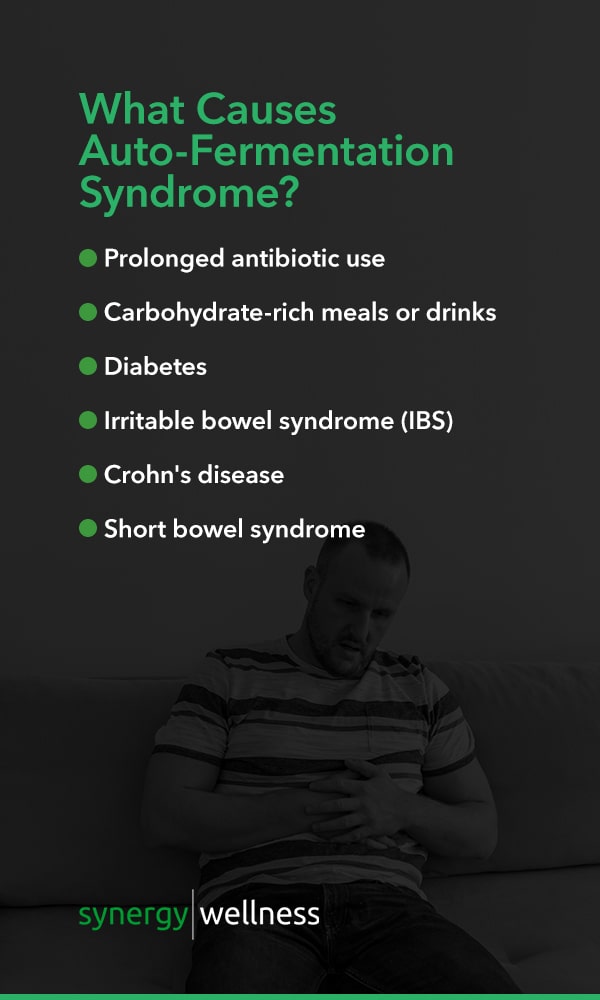
Auto-brewery syndrome is a real medical condition that can result in a person feeling intoxicated without drinking alcohol. This condition is considered rare, but it is also underdiagnosed, meaning many people may have this condition without realizing it. Learning the most common symptoms of auto-brewery syndrome can help you decide if you should seek medical treatment.
What Is Auto-Brewery Syndrome?
Auto-brewery disease, also known as gut fermentation syndrome, is a condition that causes endogenous ethanol fermentation due to bacteria or fungi in the gastrointestinal system. Gut fermentation syndrome often causes many symptoms and signs of alcohol intoxication without drinking any alcohol. There are several rare bacteria and strains of fermenting yeasts that are the pathogens that cause this syndrome.
With auto-brewery syndrome, your body converts carbohydrates and sugary foods into alcohol. Although auto-brewery syndrome is a rare syndrome, it has been known to affect both men and women. In many cases, people with auto-brewery may not receive a proper diagnosis until they start presenting symptoms when an overgrowth of fungus in the gut improperly converts carbohydrates into alcohol.
There are many microorganisms that live within the gastrointestinal tract, mainly bacteria. A type of yeast known as candida is one of the most common fungal species residing in the gut. While lower levels of fungus rarely cause complications, an overgrowth of the fungi can significantly impact a person’s overall quality of life and health.

What Causes Auto-Fermentation Syndrome?
Auto-fermentation syndrome typically develops where there is an excess of yeast, a type of fungus, present in the gut. While you cannot be born with this condition, you may be born with or develop another condition that increases your risk of developing auto-brewery syndrome. Adults, as well as children, can develop auto-brewery syndrome, especially if they have an underlying condition.
Auto-brewery syndrome typically occurs as a complication of another medical condition or even an infection or imbalance in the body. In some cases, a person’s liver may not be able to remove alcohol quick enough. Even a small amount of alcohol made from excess yeast is enough to cause symptoms of gut fermentation syndrome. While auto-brewery syndrome has many causes, some of the most common include:
- Prolonged antibiotic use: Long-term use of antibiotics can alter the gut’s microbiome and lead to overgrowth of various fungi and yeast, potentially resulting in auto-fermentation syndrome. Frequent or long-term antibiotic use can greatly increase a person’s risk of developing auto-brewery syndrome.
- Carbohydrate-rich meals or drinks: Another common cause of auto-fermentation syndrome is a diet high in processed foods and carbohydrates, which may lead to various gastrointestinal problems. Many people who develop auto-brewery syndrome report a diet high in sugar and carbohydrates, which can negatively impact gut health.
- Diabetes: Diabetes is a co-occurring condition that may increase a person’s risk of self-brewery syndrome. If your diabetes is not maintained, your blood sugar levels are more likely to spike to very high levels, increasing sugar levels and resulting in an overgrowth of yeast. Some people with uncontrolled diabetes may also be more likely to develop gut fermentation syndrome.
- Irritable bowel syndrome (IBS): IBS is another underlying medical condition that may lead a person to develop auto-brewery syndrome. IBS is a common medical condition, affecting approximately 25 to 45 million Americans. People with poorly managed or severe IBS may be more likely to develop self-brewery syndrome and experience symptoms.
- Crohn’s disease: Crohn’s disease is an inflammatory bowel disease that causes inflammation and irritation of the digestive tract, leading to various symptoms, including pain, discomfort, fatigue, diarrhea and more. The inflammation caused by Crohn’s disease can involve various parts of the digestive tract and affects people differently. People with Crohn’s disease may be at a higher risk of developing self-brewery syndrome.
- Short bowel syndrome: Short bowel syndrome is a relatively uncommon condition, affecting only three out of every one million people a year. Short bowel syndrome causes the body to not properly absorb the nutrients it needs from food because there is not enough of the small intestine. Short bowel syndrome may occur when portions of the intestine are missing due to a congenital disability, damage or surgical removal. Short bowel syndrome may increase a patient’s risk of developing auto-brewery syndrome.
Symptoms of Auto-Brewery Syndrome
Auto-brewery syndrome can make a person feel intoxicated even if they have not had any alcohol. In addition to feeling intoxicated without drinking, a person with self-brewery syndrome may feel very intoxicated after only consuming a small amount of alcohol, such as one or two beers. Many symptoms are similar to if a person was intoxicated or if they had a hangover.
- Mood changes: Auto-brewery syndrome often causes mood changes and mood swings in patients. Similar to if a person was intoxicated, auto-brewery may cause rapid mood swings and cause patients to experience many different emotions in a short period of time.
- Confusion: Because auto-brewery syndrome presents similar feelings as if a person drank alcohol, a person may experience confusion or have difficulty concentrating on a task at hand. Brain fog and general confusion are very common, as it can be disorienting for a person to feel signs and symptoms of intoxication without drinking.
- Disorientation: Some people may refer to auto-brewery syndrome as the drunkness disease because of its symptoms. Along with feeling intoxicated, many patients also feel disoriented and have trouble focusing their vision and attention on their tasks. Slurred speech and trouble mentally processing information are very common with this syndrome.
- Physical symptoms: There are many physical symptoms that occur with auto-brewery syndrome, such as flushed skin, dizziness and disorientation. Additionally, patients may experience headaches, dehydration, dry mouth burping, fatigue and more.

Urinary Auto-Brewery Syndrome
Urinary auto-brewery syndrome is a variation of auto-brewery syndrome focused on bladder fermentation, where the bladder naturally brews alcohol from the fermentation of yeast. Urinary auto-brewery syndrome, also known as bladder fermentation syndrome, causes ethanol to be produced through fermentation by the colonizing microorganism in the urinary bladder.
While bladder fermentation syndrome shares similarities with auto-brewery syndrome, they are distinct conditions. Typically, patients with urinary auto-brewery syndrome do not experience symptoms of alcohol intoxication, as many patients with auto-brewery syndrome do. Because alcohol is generated by fermentation in the gastrointestinal tract, creating positive plasma ethanol levels.
Auto-brewery syndrome is often difficult to diagnose because it is a relatively rare condition that requires a time-consuming test known as the carbohydrate challenge to diagnose. Additionally, urinary auto-brewery syndrome is also an uncommon condition meaning it may be challenging to properly diagnose unless you and your physician are aware of this condition.
How Is Auto-Brewery Disease Diagnosed?
A doctor can diagnose auto-brewery syndrome using various observational and laboratory tests. As it is a rare condition, patients often require additional testing to rule out other conditions causing symptoms. A physician will likely begin the diagnostic process by reviewing a patient’s current health and medical history.
During an appointment, patients can discuss current symptoms they may be experiencing, and a physician can perform a physical examination. From this information, a physician may require additional information and recommend other tests to examine a patient’s symptoms. If your physician suspects you may be displaying signs of auto-brewery disease, they may recommend various testing, including:
- Differential testing: One of the first steps to diagnosing auto-brewery syndrome is to rule out other conditions that may be causing these symptoms. In some cases, patients may be secretly drinking and not admitting to this behavior, which can cause symptoms similar to auto-brewery syndrome. Additionally, a physician may look for underlying psychiatric disorders or head injuries that may cause symptoms.
- Stool and urine samples: Your physician may order stool or urine samples to send to a laboratory for analysis. These samples can be evaluated to determine if any abnormal concentrations of fungi or bacteria are present, which may be a sign of auto-brewery syndrome.
- Endoscopy: Some doctors may also use an endoscope, a long and thin tube, to collect fluid from various parts of the gastrointestinal tracts. These samples are then sent to a laboratory where they can be inspected for fungal or bacterial overgrowth.
- Carbohydrate challenges: A carbohydrate challenge test is also a useful diagnostic tool for auto-brewery syndrome. For this test, patients will be asked to eat a carbohydrate-rich meal or take a sugar pill on an empty stomach. A few hours after this, a physician can check the patient’s blood-alcohol level. If a patient’s blood-alcohol levels are low or undetectable, then the patient likely does not have auto-brewery syndrome. On the other hand, if a patient’s blood alcohol levels are high after a test, this can indicate a patient may have auto-brewery syndrome.

How Rare Is Auto-Brewery Disease?
Auto-brewery syndrome is considered to be a rare disease. While considered rare, this syndrome is also considered to be underdiagnosed, meaning the total number of cases diagnosed is not truly representative of the number of cases there may be. Because auto-brewery disease is so rare, it is typically difficult to diagnose effectively.
In many cases, people may only become aware they have auto-brewery disease by accident. For example, some people only find out they have auto-fermentation syndrome if they unexpectedly fail a breathalyzer test or medical test. In most cases, auto-brewery syndrome must be causing noticeable physical and mental symptoms for a patient to seek medical attention and receive a diagnosis.
Even if a person does go to a physician, they may be misdiagnosed if a doctor is not familiar with auto-brewery disease. While many people may assume auto-brewery disease affects adults only, it can occur at any age. Children and adults can both develop this syndrome, especially if they may have an underlying medical issue that increases their risk.
One case of auto-brewery syndrome occurred in a 61-year-old man who presented symptoms in January 2010 with a five-year history of unexplained intoxication. Following foot surgery, he was treated with antibiotics and noticed extreme signs of intoxication after only one or two beers. He also noticed, on some occasions, he would experience symptoms of intoxication without drinking. As the symptoms progressed, he noticed episodes occurred more when meals were missed or after exercise.
How Does Self-Brewery Syndrome Impact Someone’s Life?
Like any disease or medical condition, self-brewery syndrome can cause various symptoms that impact a person’s daily life. Of course, more severe cases of self-brewery syndrome are likely to cause more serious symptoms and complications. While there are many potential symptoms and side effects of self-brewery syndrome, most patients often experience personal, social and legal implications related to self-brewery syndrome.
- Personal implications: Self-brewery syndrome causes numerous symptoms that can disrupt and negatively impact daily life. If a patient regularly experiences signs of intoxication, they are likely to have trouble with day-to-day responsibilities or tasks, such as going to work or driving. Additionally, many symptoms make a person feel unwell, severely impacting their quality of life and day.
- Social implications: In addition to personal implications, self-brewery syndrome also causes many social implications. For example, some people may become embarrassed or experience difficulties in various relationships if they often display gut fermentation syndrome symptoms. Additionally, some people with auto-brewery syndrome may also feel self-conscious if they experience intoxication symptoms, especially if they occur in a public setting.
- Legal implications: Self-brewery syndrome can also lead to many legal complications, especially if a person is not aware they have self-brewery syndrome. If a person operates heavy machinery or drives a car when their blood-alcohol level is higher than the legal limit, they can become in trouble with the law. Additionally, if a patient has a blood alcohol level that is too high when working or caring for children, they may be at a higher risk of an accident and subsequent legal problems.
How Is Auto-Brewery Syndrome Treated?
The first step to treating auto-brewery syndrome is to stabilize the patient and control and maintain alcohol levels within the gut’s microbiome. After successful treatment, many patients can lower their risk of relapse by avoiding highly processed foods that are generally rich in carbohydrates. In many cases, a patient may need to work with a nutritionist or dietician to pinpoint specific foods that may need to be eliminated from the diet.
Any aspect that may cause an imbalance between beneficial and potentially harmful bacteria may increase the risk of fermentation in the gut. Because antibiotics may worsen this imbalance, it is generally best to avoid these if possible. If you need to take antibiotics, it is important to test for any fermenting pathogens following treatment.
Auto-Brewery Syndrome Treatment
Suppose a patient is diagnosed with auto-brewery syndrome and displays active symptoms, such as a dangerously high blood alcohol level. In that case, the patient will need to be stabilized and treated for potential signs of alcohol poisoning. Once the patient has stabilized, the physician can begin creating a long-term treatment to improve various symptoms of self-brewery syndrome.
In some cases, a multistrain probiotic can be an effective supplement that can help balance bacteria levels in the gastrointestinal tract and manage symptoms. Drug therapy and a prescription medication based on the patient’s symptoms are also effective auto-brewery syndrome treatments. Many patients often benefit from one or more courses of polyenes or azoles.
Auto-Brewery Syndrome Diet
One of the most useful steps to managing auto-brewery syndrome is diet modification and limiting foods that may trigger auto-brewery symptoms. While an ideal diet may vary from person to person, most people with auto-brewery syndrome benefit from a diet low in carbohydrates and high in proteins. Reducing simple and complex sugars can reduce the overall amount of alcohol fermented in the gastrointestinal tract.
Can Auto-Brewery Syndrome Lead to Alcohol Addiction?
After diagnosing and treating auto-brewery syndrome, some patients may experience alcohol cravings, even if the patient does not actively drink alcohol. It is important that patients are educated about the possibility of alcohol addiction following treatment. If needed, patients may be referred to an alcohol treatment program to address any alcohol cravings.
In many cases, auto-brewery syndrome is often incorrectly labeled as alcohol consumption, leading to potential personal, legal and social issues. Even if self-brewery syndrome is treated effectively, the long-term exposure to endogenous ethanol may increase a person’s craving for alcohol and lead to subsequent drinking or alcohol consumption.
Find Treatment for Alcohol Addiction
At Synergy Wellness, we are proud to help people reclaim their life and stop drinking. We offer comprehensive medical alcohol treatment that uses effective medications with addiction counseling treatments. Because quickly quitting alcohol can be dangerous and increase the risk of relapse, professional alcohol rehabilitation can help patients through this process and minimize negative side effects.
Learn more about our alcohol addiction services in Bakersfield & Fresno, CA and contact us online today or call 661-878-9100.




